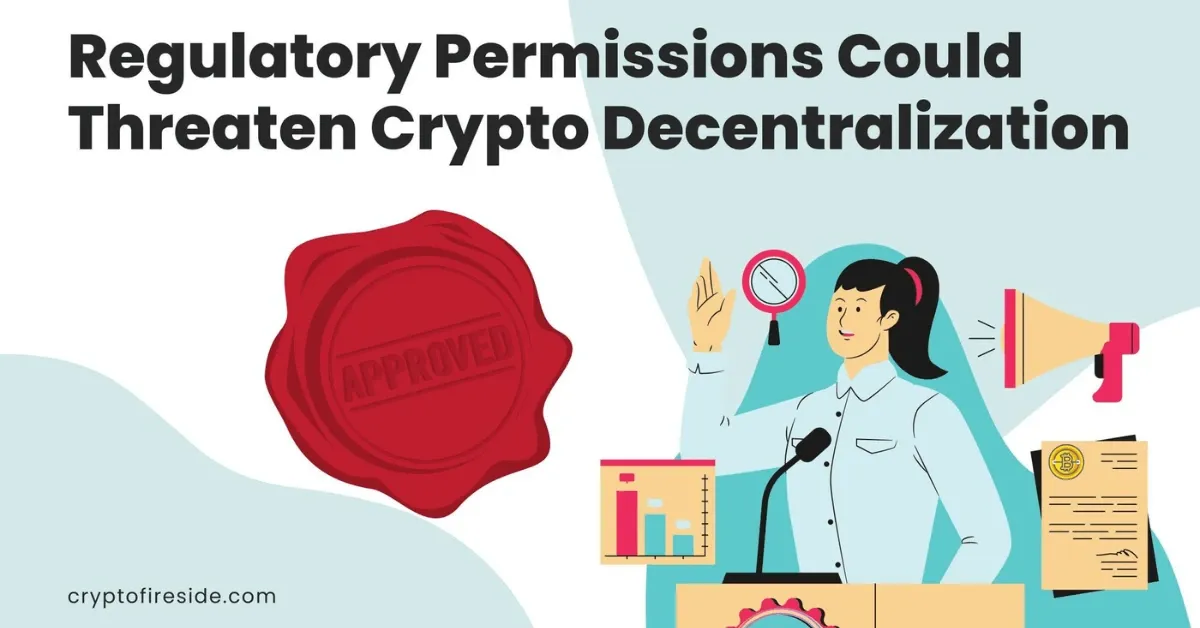Regulatory Permissions Could Threaten Crypto Decentralization
What happens to the decentralization of cryptocurrency once regulators get involved? Learn here!

Cryptocurrencies have one key selling factor that has always made them stand out as the next evolution of money: the decentralized nature of their creation.
Traditional finance currencies tend to have a centralized arbitrator determining their valuation and supply. Decentralization simply means the forces of demand and supply determine the values of a currency. As a result, cryptos are a top choice as a tradeable commodity, notwithstanding the recent sector-wide bear market.
However, in the wake of the big push for cryptocurrency regulation, there is one central point of concern; by giving into what regulators want, are we sacrificing the very purpose of using digital currencies, decentralization? This article will discuss what it truly means to regulate cryptocurrencies. Read on
Changing Regulatory Environments
Blockchain is just a little over a decade old, and that's very young in the world of business and finance. The conundrum with any large industry having such a young age is that authorities get caught flat-faced where regulation of the same is approved.
Governments may try to apply rules governing other older but related industries, but it risks leaving loopholes that can be exploited. The only solution is enacting regulations for the same, which takes time.
But that's exactly what is occurring. Many governments have been increasing regulations all around for all blockchain projects.
Going at it Alone
It must be noted that news on worldwide improvements in the regulatory environments of cryptos is welcome news for both governments and blockchain projects. It helps tame malicious incidents that would otherwise damage crypto adoption rates, a good example being the rug-pull scam.
But instead of governments cooperating in drafting regulatory environments that cut across borders, many prefer going at it alone. It creates a situation where each nation can choose to treat cryptocurrencies within their jurisdiction as they deem fit. Some opted to be supportive, but many are quite combative regarding blockchain regulation.
Threats to Decentralization
Separately adopted regulatory environments as tailored by each government are counter-productive to blockchain technology. Without blanket agreements on norms, several actions by some nations pose threats to the decentralization and privacy advantages of cryptos.
Limiting CBDCs as the only Permitted Digital Currency
Central Bank Digital Currencies are quite possibly the biggest threat to cryptos and their decentralized nature. They are a form of digital currency designed to appear like cryptos but are markedly different.
To begin with, they are all issued and regulated by a central arbitrator, usually a nation's central bank or equivalent monetary authority. It is a sharp contrast to crypto's peer-to-peer system that lacks a central governing body.
CBDCs offer little if any, privacy and anonymity thanks to the government being their governing authority. They, therefore, lack the benefit of decentralized systems that offer unparalleled privacy.
The new type of token also acts as a digital form of the national fiat currency of the government issuing it. With such heavy involvement by authorities on CBDC projects, cryptos are banned in several currencies in favor of these tokens. It is a direct threat to crypto's existence as a whole.
Stricter KYC Requirements
Several nations have imposed strict KYC regulations as a prerequisite for continued operations. They've been mainly focused on crypto exchanges thanks to their categorization as Money Service Businesses (MSB). Requirements also include strong filing and reporting of all transactions.
While exchanges have been the only targets, the possibility of its expansion to include blockchain in the future is likely. The possible argument for such an expansion in KYC requirements is the ability to make transfers within the blockchain. It can be classified as an MSB as a result.
But that doesn't bode well for blockchain's decentralized nature, which is its guarantee of privacy and anonymity. The peer-to-peer system doesn't require the gathering of data that could be used to identify transacting partners.
The possibility is that it may have to change. A custodial organization may be required to gather the information, making blockchain significantly less decentralized. Private coins with central arbitrators and thus the ability to easily implement KYC requirements could be better placed to get regulatory approvals.
Potential Consequences of Reduced Decentralization from Regulation
Curtailed Innovation
With increasing regulatory requirements targeting a reduction in decentralization, sinister consequences seem to be on the horizon. That is a greatly subdued rate of innovation and the creation of new projects.
DeFi is arguably the most vibrant part of the blockchain. Very high levels of decentralization entirely drive it. New projects could dry up with the increased regulatory-fueled reversal of decentralization. Web 3.0 is a good example. Its aim of reducing data conversation on Big Tech firms by adopting decentralization will end up being pyrrhic as all data ends up centralized once more.
Subdued Adoption Rates
The primary attraction of people to blockchain as a means of transferring funds is its high privacy and anonymity levels. Investors have been committing billions to crypto purchases because of the ability to earn yields via trading and other forms like staking.
But all these are a direct result of the decentralization nature. As regulations increase and decentralization is eroded, crypto customers will no longer have incentives to participate in blockchain. Adoption rates may tank significantly since the resultant blockchain setup won't differ significantly from traditional finance.
Author's Notes
Decentralized systems in the blockchain have proven their ability to impact profound socio-economic advancements worldwide. They create the possibility of a trustless system, improve transparency and drastically cut transfer costs. But perhaps more importantly, they protect people from data abuse and increase financial freedom.
We do not consider the blockchain's decentralized systems as a bug that has to be fixed; it is an innovation that has proven to be more efficient as it stands every coming day. Regulations are more productive if the focus is on issues like achieving uniformity in blockchain operations, improving taxation, and enhancing project transparency. Nonetheless, crypto enthusiasts' best interest is to keep the decentralization fire that Satoshi Nakamoto lit burning.
Want to Keep Reading?
- Blockchain Backer - A Crypto YouTuber Review (Read THIS Before Watching)
- How Does OpenSea Make Money? (This Will SURPRISE You)
- Get Smart With Money (A NETFLIX Review)
- GameStop NFT Marketplace Review
- Streaming Services That Accept Crypto
Want to know how you can support Crypto Fireside?
Sign up below. It's free, it's easy, and it allows you to comment and join the discussion 🔥
